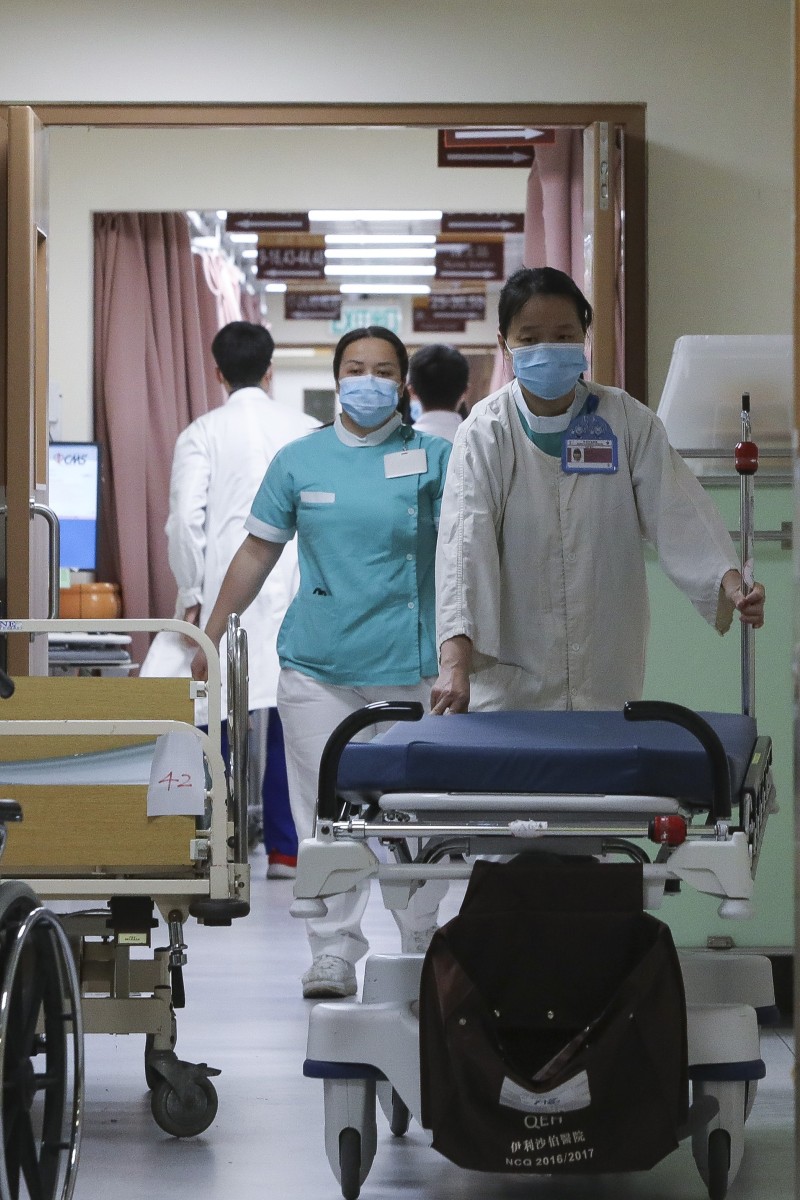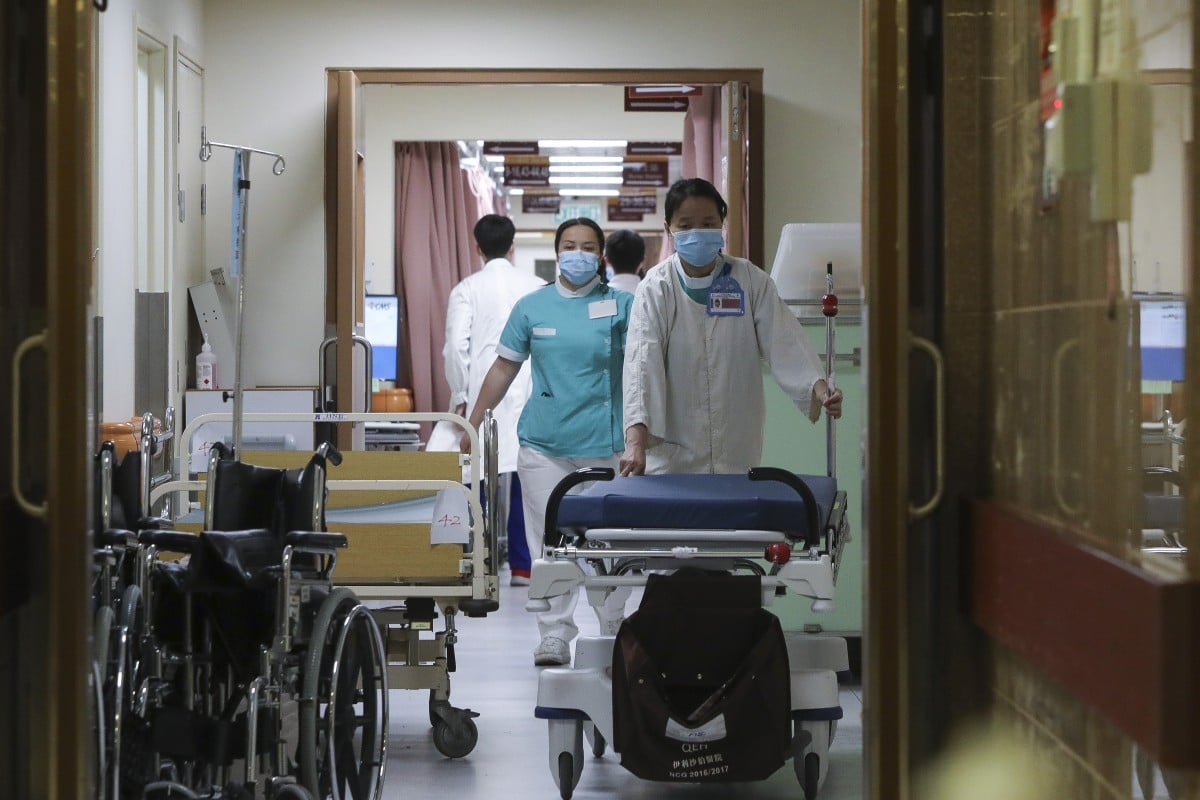
HK nursing students on challenges faced by the medical community, and concerns for after graduation we can all relate to
HK hospitals aren’t just overcrowded with patients, they’re understaffed, too. We spoke to three students about why they want to become nurses.
 For many nurses, the workplace feels like a war zone.
For many nurses, the workplace feels like a war zone. Public hospitals in Hong Kong have long had problems with overcrowding. This is particularly true in winter and the flu season – as of Tuesday, most public hospitals in the city have seen bed occupancy rates of more than 100 per cent. According to Hospital Authority, Prince of Wales Hospital and Tuen Mun Hospital are seeing bed occupancy rates of 119 per cent.
For Hong Kong nurses, being overworked is almost a given. On average, each takes care of at least 10 patients. According to health sector lawmaker Dr Joseph Lee Kok-long, the international nurse-to-patient ratio is one to six. For many, their workplace is like a war zone, where they work multiple shifts, and fight against understaffing.
Overworked HK doctors and nurses protest against being overworked and understaffed
Last week, more than 100 members of the Association of Hong Kong Nursing Staff, which represents 60 per cent of the city’s 50,000 nurses, stood outside the government headquarters in protest against their poor working conditions.
With these problems in mind, Young Post spoke to three nursing students who are graduating this year about their fears over joining the workforce, their aspirations, and what changes they would like to see in the city’s health care system.
Emily Ng Yee-tung, 22, is graduating from the University of Hong Kong in May. She said that, when she decided to study nursing, the hardships of actually being a nurse had not really occurred to her. “It wasn’t until I did my first hospital placement two years ago that I [saw the] reality.”
Ng is more worried than she is excited about graduating. Her anxiety, she said, is especially heightened when she is on placement and trying to adapt to the long shifts, just like fully qualified nurses.
So you wanna study medicine? A CUHK medical student reveals what it’s really like
“Patients [also] tend to have higher expectations for nurses nowadays,” Ng added. “They read up on treatments online and challenge us.”
Despite there being a steady stream of nurses like Ng graduating every year, there remains a shortage of nurses because those already in the workforce are leaving. Last year, the turnover rate – the number of people leaving during a certain period of time – in public hospitals was at a five-year high of 5.7 per cent. In 2013-14, the rate was 4.7 per cent.
Ng said that she thinks more nurses would stay on if they had better working hours. “I’ve seen nurses who have been around for 20, 30 years still working overnight at least once a week,” she said.
Resilient, anxious or avoidant: which stress type are you, and how do you deal with problems?
Another student, Joyce Li Yuet-sum, agrees. Many of her fellow classmates at Caritas Institute of Higher Education are losing interest and their passion for nursing because of the long hours involved.
“It’s mostly because of the heavy workload,” Li, 24, said. “You don’t get time to rest, to hang out with your family and friends. Your whole life gets disrupted because of the job.”
“Some of my classmates aren’t given beds during their hospital placements, so they use sleeping bags in the locker room in between their morning and overnight shifts.” This is because, she said, many of the hospitals where they work are far from their homes – there would be little point in their retuning home, only to turn back around almost straightaway for their second shift.
She acknowledged that despite wanting to see more flexibility in working hours, it was a bit of a vicious cycle – the more nurses quit, the less likely the working hours would ease, which would lead to more people leaving.
Upon graduating, Li will apply for jobs at public hospitals, but she said she wants to eventually transfer to the private sector. The places that need the most staff are not the places most of her classmates want to go.
“Apart from a few who want to work at Accident and Emergency, [we] don’t want any thrills, to be honest. We’re not looking for excitement.”
Ernie Lam Ching-hin, a final year student at the Chinese University of Hong Kong, is still full of enthusiasm for nursing, despite the current working conditions.
“When I see a patient go from being really sick to healthy, it makes me happy,” he said. When Lam, 22, was on placement, he took care of an old woman who refused to take her medicine. It was only after many days of cajoling and encouragement was he able to convince her to resume treatment. It had felt like a huge achievement, he said, and one of the reasons why he is looking forward to graduating.
Lam said he wants to try case management, which means being personally responsible for more than 10 cases. Throughout one shift, he would have to take care of each patient’s needs, from measuring blood pressure, to distributing medicine, to keeping the doctors’ orders.
On the job: A doctor of Chinese medicine shows us the basics of acupuncture and other TCM techniques
Most of Lam’s concerns stem from the shift in responsibility that comes from graduating. “When you’re a student, everything you do is under supervision, and you can ask for help. When you [graduate], others come to you for help.”
Earlier this month, a group of public sector nurses wrote an open letter to the Hospital Authority. In it, they blamed officials and administrative staff for playing a numbers game – trying to make their numbers of patients look good on paper, despite being vastly different in reality. For example, if a ward’s maximum occupancy rate is 44 patients, temporary beds can be set up in the corridor. There is no limit to when hospital stop accepting patients.
Lam added that, although the Hospital Authority is hiring more part-time nurses, hospital policy prohibits them from performing complex tasks. Their help, therefore, is limited and often doesn’t alleviate the workloads of full-time nurses.
A student in vet school tells us what it's really like to study veterinary medicine at university
“I’ve already anticipated that there will be a lot of hardship and stress,” he admitted. “It’s tiring even now, during my placement.” Still, Lam said, he is always on the lookout for ways to alleviate that stress. He often turns to his seniors for advice, and to share with them the struggles that he faces.
What motivates Lam, even through the tough times, are his classmates and colleagues. “They tell me to not forget how I felt [about making a difference] when I first started.”
When asked about the changes he wants to see in nursing in Hong Kong, Lam said that – other than having more staff in every ward – he hopes his gender will not restrict him from his area of speciality. Most nurses who work in gynaecology and obstetrics are women, but Lam said that he hopes this will change in the near future.
“Given that we’re all trained professionals, male nurses should not be limited to certain wards because of our gender.”
